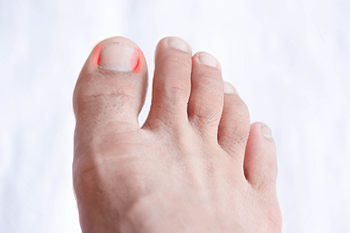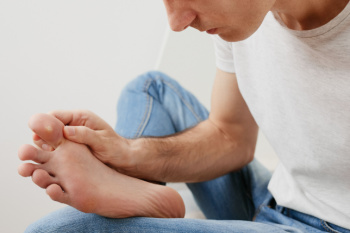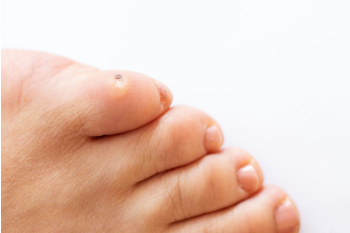Connect With Us
Blog
Items filtered by date: February 2024
How to Tell if an Ingrown Toenail Is Infected
 Besides pain and annoyance, ingrown toenails are also at risk of developing an infection, especially if left untreated. Redness, swelling, and increased pain surrounding an ingrown nail edge can all be signs of an infection. The toe could also become warm to the touch and emit discharge or pus where the ingrown toenail is, which are further indications of infection. Additionally, consistent discomfort or throbbing pain, even when not applying pressure to the toe, can suggest an infection. Ingrown toenail infections can escalate if left untreated, so it is important to treat them properly. If you suspect an infection caused by an ingrown toenail, it is suggested that you seek prompt treatment from a podiatrist.
Besides pain and annoyance, ingrown toenails are also at risk of developing an infection, especially if left untreated. Redness, swelling, and increased pain surrounding an ingrown nail edge can all be signs of an infection. The toe could also become warm to the touch and emit discharge or pus where the ingrown toenail is, which are further indications of infection. Additionally, consistent discomfort or throbbing pain, even when not applying pressure to the toe, can suggest an infection. Ingrown toenail infections can escalate if left untreated, so it is important to treat them properly. If you suspect an infection caused by an ingrown toenail, it is suggested that you seek prompt treatment from a podiatrist.
Ingrown toenails may initially present themselves as a minor discomfort, but they may progress into an infection in the skin without proper treatment. For more information about ingrown toenails, contact Dr. David Ungar of Personal Foot Care. Our doctor can provide the care you need to keep you pain-free and on your feet.
Ingrown Toenails
Ingrown toenails are caused when the corner or side of a toenail grows into the soft flesh surrounding it. They often result in redness, swelling, pain, and in some cases, infection. This condition typically affects the big toe and may recur if it is not treated properly.
Causes
- Improper toenail trimming
- Genetics
- Improper shoe fitting
- Injury from pedicures or nail picking
- Abnormal gait
- Poor hygiene
You are more likely to develop an ingrown toenail if you are obese, have diabetes, arthritis, or have any fungal infection in your nails. Additionally, people who have foot or toe deformities are at a higher risk of developing an ingrown toenail.
Symptoms
Some symptoms of ingrown toenails are redness, swelling, and pain. In rare cases, there may be a yellowish drainage coming from the nail.
Treatment
Ignoring an ingrown toenail can have serious complications. Infections of the nail border can progress to a deeper soft-tissue infection, which can then turn into a bone infection. You should always speak with your podiatrist if you suspect you have an ingrown toenail, especially if you have diabetes or poor circulation.
If you have any questions, please feel free to contact our office located in Farmington, MI . We offer the newest diagnostic and treatment technologies for all your foot care needs.
Why Plantar Warts Come Back and How to Stop Them
 It can be frustrating to manage plantar warts that return after treatment. Plantar warts are a common foot condition that develop when the human papillomavirus, or HPV, infects the bottom of the foot. Plantar warts can come back because HPV can remain dormant in the skin even after visible warts are treated, making it possible for new warts to develop in the same spot or nearby. The skin tissue may also hold small, undetectable warts or viral particles in surrounding skin tissue, leading to more warts in the future. Additionally, a weakened immune system, exposure to HPV in communal areas, such as locker rooms or swimming pools, or incomplete removal of the wart during treatment can lead to recurrent plantar warts. To prevent plantar warts from coming back, it is suggested that you consult a podiatrist who can offer various treatments for the warts and minimize the chance of recurrence.
It can be frustrating to manage plantar warts that return after treatment. Plantar warts are a common foot condition that develop when the human papillomavirus, or HPV, infects the bottom of the foot. Plantar warts can come back because HPV can remain dormant in the skin even after visible warts are treated, making it possible for new warts to develop in the same spot or nearby. The skin tissue may also hold small, undetectable warts or viral particles in surrounding skin tissue, leading to more warts in the future. Additionally, a weakened immune system, exposure to HPV in communal areas, such as locker rooms or swimming pools, or incomplete removal of the wart during treatment can lead to recurrent plantar warts. To prevent plantar warts from coming back, it is suggested that you consult a podiatrist who can offer various treatments for the warts and minimize the chance of recurrence.
Plantar warts can be very uncomfortable. If you need your feet checked, contact Dr. David Ungar from Personal Foot Care. Our doctor will assist you with all of your foot and ankle needs.
About Plantar Warts
Plantar warts are the result of HPV, or human papillomavirus, getting into open wounds on the feet. They are mostly found on the heels or balls of the feet.
While plantar warts are generally harmless, those experiencing excessive pain or those suffering from diabetes or a compromised immune system require immediate medical care. Plantar warts are easily diagnosed, usually through scraping off a bit of rough skin or by getting a biopsy.
Symptoms
- Lesions on the bottom of your feet, usually rough and grainy
- Hard or thick callused spots
- Wart seeds, which are small clotted blood vessels that look like little black spots
- Pain, discomfort, or tenderness of your feet when walking or standing
Treatment
- Freezing
- Electric tool removal
- Laser Treatment
- Topical Creams (prescription only)
- Over-the-counter medications
To help prevent developing plantar warts, avoid walking barefoot over abrasive surfaces that can cause cuts or wounds for HPV to get into. Avoiding direct contact with other warts, as well as not picking or rubbing existing warts, can help prevent the further spread of plantar warts. However, if you think you have developed plantar warts, speak to your podiatrist. He or she can diagnose the warts on your feet and recommend the appropriate treatment options.
If you have any questions please feel free to contact our office located in Farmington, MI . We offer the newest diagnostic and treatment technologies for all your foot and ankle needs.
Types of Foot Corns

Corns on the feet are thick, hardened skin bumps that typically form on bony areas, such as on the top or sides of the toes, due to friction and pressure. The three types of corns are hard corns on toe tops, soft corns between toes, and seed corns on the soles of the feet. Foot corns develop due to wearing ill-fitted shoes, either too tight or too loose, causing rubbing and pressure. Improperly fitting socks or not wearing any socks can also lead to friction. Individuals with conditions like arthritis, bunions, or hammertoes are at higher risk. Preventing foot corns involves wearing well-fitting, comfortable shoes, avoiding high heels or pointy-toed shoes, and using corn pads for added protection. Moisture-wicking socks may help to reduce friction. If you have foot corns that are causing you discomfort or showing signs of infection, it is suggested that you consult a podiatrist for an examination and proper treatment or removal.
If you have any concerns regarding your feet and ankles, contact Dr. David Ungar of Personal Foot Care. Our doctor will treat your foot and ankle needs.
Corns: What Are They? and How Do You Get Rid of Them?
Corns can be described as areas of the skin that have thickened to the point of becoming painful or irritating. They are often layers and layers of the skin that have become dry and rough, and are normally smaller than calluses.
Ways to Prevent Corns
There are many ways to get rid of painful corns such as wearing:
- Well-fitting socks
- Comfortable shoes that are not tight around your foot
- Shoes that offer support
Treating Corns
Treatment of corns involves removing the dead skin that has built up in the specific area of the foot. Consult with Our doctor to determine the best treatment option for your case of corns.
If you have any questions please feel free to contact our office located in Farmington, MI . We offer the newest diagnostic and treatment technologies for all your foot and ankle needs.
It's Time for Beautiful Feet
How to Find Foot Pain Relief From Arthritis
 There are multiple varieties of arthritis, and a challenge many of them share in common is foot pain. Arthritic foot care is important to finding relief from arthritis, a condition that has no cure. Luckily, help from a podiatrist, lifestyle modifications, and physical therapy can all contribute to happier feet. If you have foot pain, it is suggested you consult a podiatrist who can provide personalized guidance based on your condition. They may recommend suitable footwear with good arch support and cushioning to reduce pressure on the affected joints. Podiatrists may also recommend regular stretching exercises, such as gentle calf stretches and toe exercises, which can help maintain flexibility and alleviate stiffness in the feet. Lifestyle modifications, such as losing weight and switching to lower-impact exercise, can also be important to arthritic foot care. Over-the-counter or prescribed medications can be part of the treatment plan, and in some cases, your podiatrist may suggest custom orthotic inserts to provide additional support to your feet. If you are experiencing foot pain from arthritis, it is suggested that you make regular appointments with a podiatrist for ongoing care.
There are multiple varieties of arthritis, and a challenge many of them share in common is foot pain. Arthritic foot care is important to finding relief from arthritis, a condition that has no cure. Luckily, help from a podiatrist, lifestyle modifications, and physical therapy can all contribute to happier feet. If you have foot pain, it is suggested you consult a podiatrist who can provide personalized guidance based on your condition. They may recommend suitable footwear with good arch support and cushioning to reduce pressure on the affected joints. Podiatrists may also recommend regular stretching exercises, such as gentle calf stretches and toe exercises, which can help maintain flexibility and alleviate stiffness in the feet. Lifestyle modifications, such as losing weight and switching to lower-impact exercise, can also be important to arthritic foot care. Over-the-counter or prescribed medications can be part of the treatment plan, and in some cases, your podiatrist may suggest custom orthotic inserts to provide additional support to your feet. If you are experiencing foot pain from arthritis, it is suggested that you make regular appointments with a podiatrist for ongoing care.
Arthritis can be a difficult condition to live with. If you are seeking treatment, contact Dr. David Ungar from Personal Foot Care. Our doctor can provide the care you need to keep you pain-free and on your feet.
Arthritic Foot Care
Arthritis is a joint disorder that involves the inflammation of different joints in your body, such as those in your feet. Arthritis is often caused by a degenerative joint disease and causes mild to severe pain in all affected areas. In addition to this, swelling and stiffness in the affected joints can also be a common symptom of arthritis.
In many cases, wearing ill-fitting shoes can worsen the effects and pain of arthritis. Wearing shoes that have a lower heel and extra room can help your feet feel more comfortable. In cases of rheumatoid arthritis, the arch in your foot may become problematic. Buying shoes with proper arch support that contour to your feet can help immensely.
Alleviating Arthritic Pain
- Exercises that stretch the foot can prevent further pain and injury and increase mobility
- Most of the pain can be alleviated with anti-inflammatory drugs, heat, and topical medications
- Massages can help temporarily alleviate pain.
It is best to see your doctor for the treatment that is right for your needs and symptoms. Conditions vary, and a podiatrist can help you determine the right method of care for your feet.
If you have any questions, please feel free to contact our office located in Farmington, MI . We offer the newest diagnostic tools and technology to treat your foot and ankle needs.

